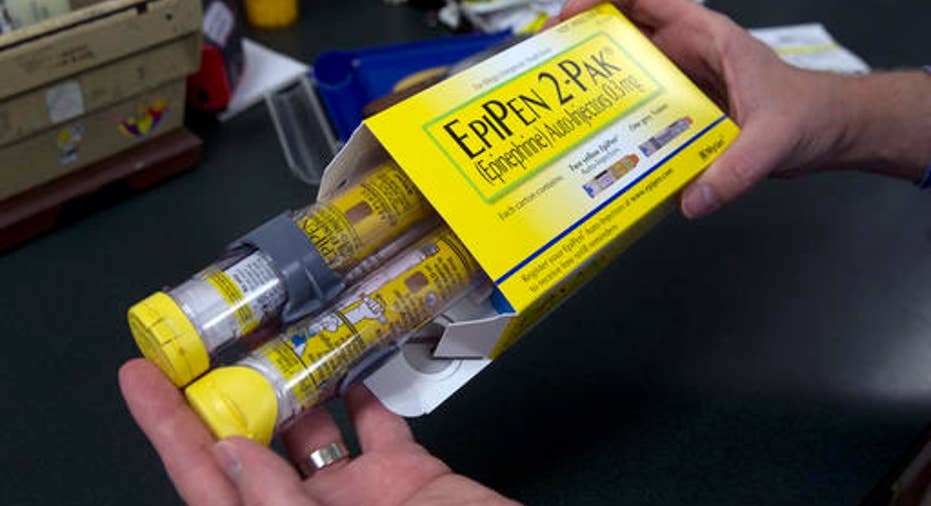How Mylan CEO Bresch Played the System With EpiPen

The latest target in Washington’s ongoing hunt for big pharma price gougers is Heather Bresch, embattled CEO of generic and specialty pharmaceutical giant Mylan. While politicians and pundits have been quick to take sides, I’m not sure anyone has painted an accurate picture of the story’s alleged villain, Ms. Bresch.
Politics and ethics aside (we’ll deal with all that shortly), Bresch singlehandedly turned EpiPen – a device that delivers life-saving epinephrine to patients with severe allergic reactions – into the first real blockbuster product in Mylan’s 55-year history.
Pushing an aggressive combination of brand marketing and federal legislation, Bresch built strong demand for EpiPen while at the same time helping to suppress competition by getting the FDA to focus more on foreign generics manufacturers. And the regulator’s vague rules on mechanical devices didn’t hurt.
Bresch exploited an effective $1 billion monopoly by jacking up wholesale pricing on the epinephrine injector more than 500% over a seven-year span. Shares of Mylan roughly quadrupled over the same period. Today, the EpiPen accounts for nearly half the company’s operating profit.
The question is, should Bresch be lambasted for using “the system” to create and profit from a blockbuster product? Defending herself in a recent interview, the West Virginia-born executive indeed blamed the system,” saying, “The irony is the system incentivizes high prices,” she said. “No one’s more frustrated than me.”
Are you buying that? Me neither. There’s nothing ironic about Bresch’s astute mastery of the bureaucratic mess known as the American healthcare system. And while she may not be quite the villain that Hillary Clinton and others make her out to be, a closer look shows more than a fair amount of ethical flexibility and cronyism in her makeup.
The Heather Bresch Situation
In 2007, Mylan CEO Robert Coury pulled off a major coup, acquiring Merck’s $6.7 billion generics business. The challenge was to digest a division that was far bigger than the acquiring company. Coury chose one of his top executives, Ms. Bresch, to lead the integration effort.
The 15-year veteran was head of North American operations at the time, but as director of government relations, she’d demonstrated a real talent for spearheading legislation favorable to the company, including the 2003 Medicare Modernization Act known as Medicare Part D.
Later that year, Coury promoted Bresch to COO. The announcement stated that Bresch had an MBA from West Virginia University (WVU). But when the Pittsburgh Post-Gazette contacted the school to verify, they were told that, while Bresch had attended the program in the late ‘90s, she only had about half the credits needed for the degree.
A few days later, according to the Post-Gazette’s original reporting, the school reversed itself, saying they’d made a clerical mistake and Bresch did indeed have an MBA. But, according to an in-depth investigation by the Post-Gazette and a 95-page report by a special WVU panel, she did not.
Turns out that Bresch’s father, Joe Manchin, was governor of West Virginia at the time (he’s now a U.S. senator). Apparently Manchin, Bresch and Mylan co-founder and chairman Milan Puskar all had strong ties to university president Mike Garrison. In fact, Puskar endowed the school’s stadium and business school’s deanship.
After learning that her MBA had been questioned, Bresch picked up the phone and called her old friend Garrison (they went to high school together), who, according to the report, pulled grades from thin air and fabricated the degree, along with the lame excuse about a record-keeping snafu.
Garrison later resigned, along with WSU’s provost and business school dean. Not Bresch. And instead of firing her, as it should have, the board promoted her to CEO.
Today, Bresch cheekily refers to the scandal as “the Heather Bresch situation.” In a 2015 Fortune interview, she said, “I certainly to this day believe I did everything I needed to do to get my degree.” I don’t know about you, but that sounds pretty delusional to me. Or maybe that’s just how leaders with more hubris than ethics sound.
Bresch’s Baby
To her credit, Bresch saw potential in EpiPen – a modest $200 million product in Merck’s portfolio – and made it her baby. She created broad awareness of the perils of anaphylactic shock, particularly in children, and pushed for legislation that would ultimately make EpiPen ubiquitous in schools and other public places.
Her efforts played a major role in the FDA changing prescription guidelines from one EpiPen to two, and from patients who had experienced anaphylaxis to “anyone at risk,” whether they’d had a previous episode or not. That alone more than doubled the injector’s market size.
Was Bresch’s aggressive marketing justified or self-serving fear-mongering? Probably a little of both.
Bresch also spearheaded the Generic Drug User Fee Act, which increased FDA scrutiny on Mylan’s foreign competitors and got them to pay for it as well. Meanwhile, a competing product from Israeli generic drug giant Teva recently stalled in the FDA approval process. And last year, French rival Sanofi was forced to recall its own epinephrine injector. Coincidence? I don’t believe in coincidences.
Last year, Mylan acquired the generic drug business of Abbot Labs and moved its headquarters overseas in a now-familiar tax inversion scheme. Its effective tax rate over the past four quarters averages out to about 10%.
In my view, Bresch is a shrewd business executive with all the means and morality of a modern day politician. And I don’t mean that last part in a good way. Villain or not, she clearly knows how to play the system.



















